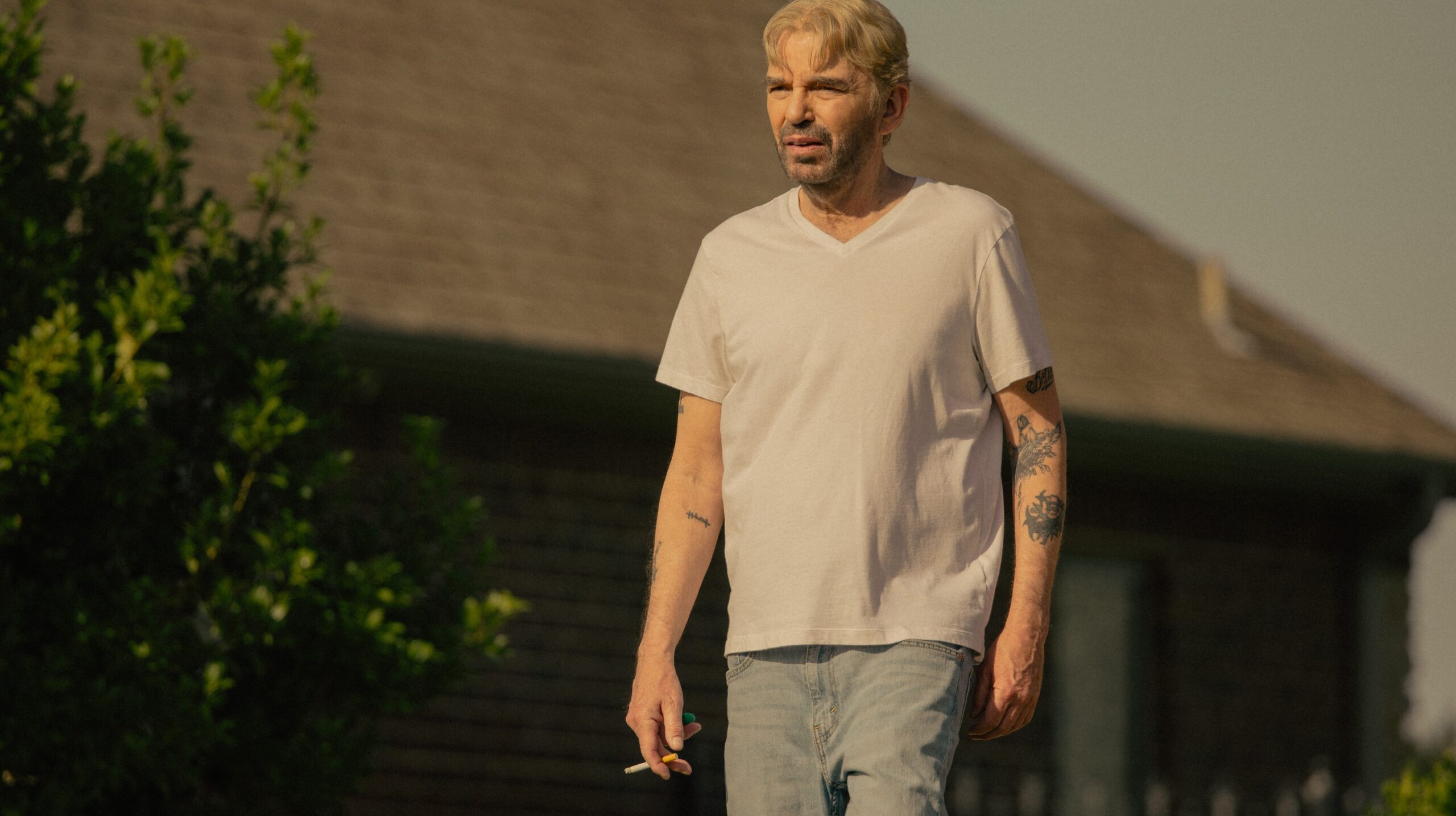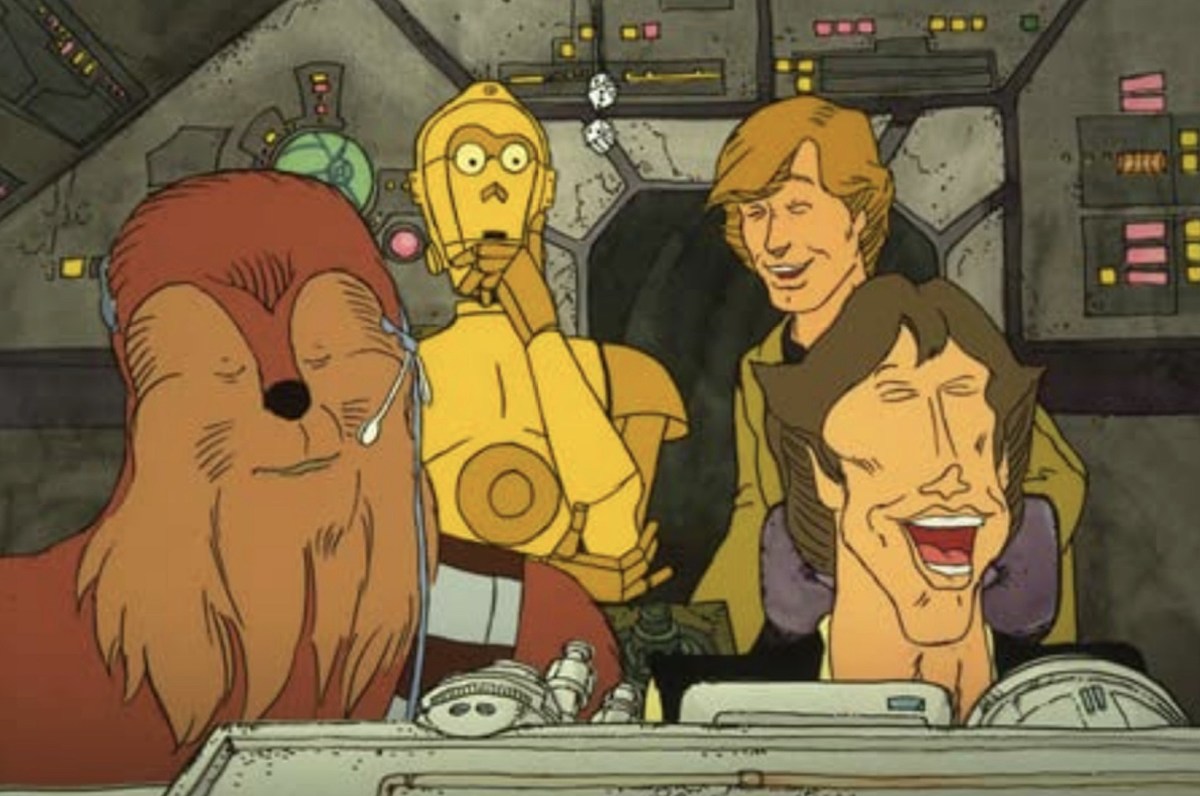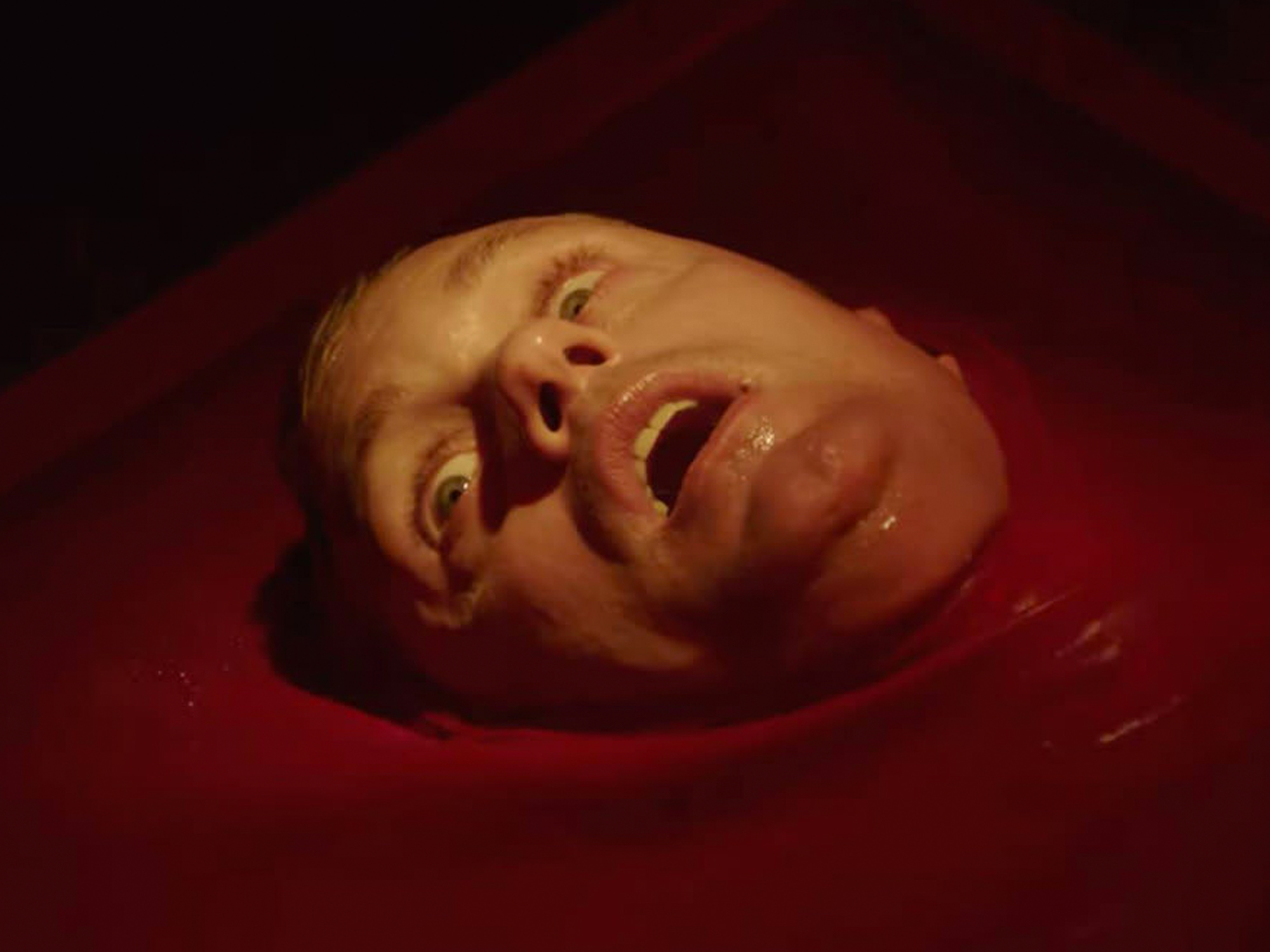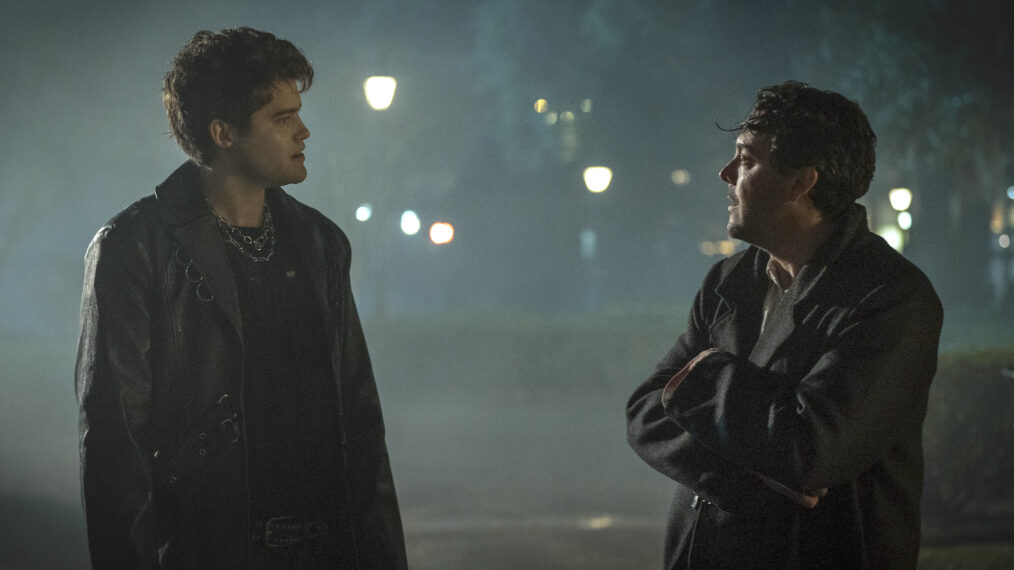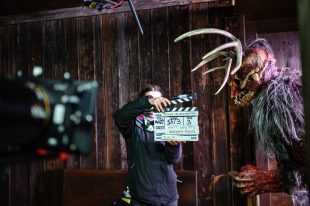
A TOWN CALLED PURGATORY won Best Feature Film at both the Creature Feature Weekend Film Festival and the Garden State Film Festival. HNN is proud to share some EXCLUSIVE behind-the-scenes pictures.
Synopsis: In the haunting aftermath of the Civil War, principled Yankee Lawman Beau Riffen (Arnold) joins forces with Cody Parnum (De Luca), a tormented ex-Confederate tracker. Their quest to apprehend notorious train robbers leads them to Purgatory, a town eerily deserted.
Amidst the silence, they cross paths with a lone African American trapper and a prisoner harboring secrets who whispers of an ancient menace. As the shadows of Purgatory tighten, an impending confrontation with The Skinwalker beckons, testing bonds of trust and humanity in their gripping fight for survival.
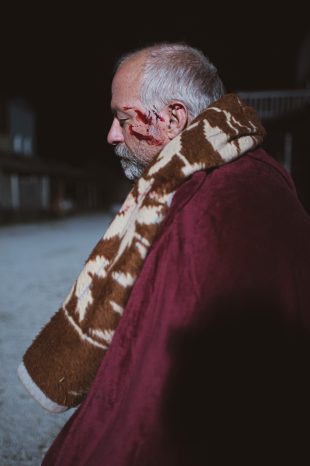
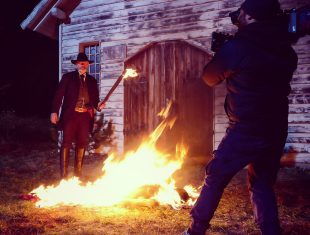
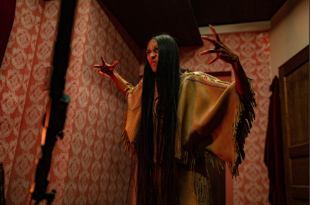
Filmmakers Ken Arnold and Dan De Luca first made a mark on the movie landscape with 2017’s wildly-successful horror comedy The Night Watchmen. The vampire flick played festivals all over the world (including the legendary Fantasia and Sitges film festivals), capturing over a dozen major awards during its popular international run.
The Night Watchmen won praise for its mix of monsters and mirth, so to come up with something equally unique, the duo once again thought outside the box and fashioned another cinematic genre mashup: A Town Called Purgatory, a horror Western based on Native American lore and American history.
“When COVID-19 had shut down the world in 2020, it was the right time to develop a script,” recalls A Town Called Purgatory writer, producer and star Dan De Luca, who wore the same production hats on The Night Watchmen. “The film would have to be easily made under the new restrictions and COVID protocols.
“Well, as we all realize, nothing is easy in the film world, and the next thing we knew we were on a plane to Austria in the middle of COVID to film an American Western,” De Luca continues. “A ‘Strudel Western,’ if you will. While the world was in limbo, we made A Town Called Purgatory.”
The project was born out of the unique circumstances of the COVID-19 lockdown. With civilization at a standstill, De Luca and his Purgatory/Night Watchmen co-writer, producer and star Ken Arnold found an opportunity to focus on creative storytelling that could be developed within the constraints of the pandemic.
“To us, this was a challenge, not an obstacle. Those constraints would require one location, a small cast and the ability to isolate from the public,” De Luca explains. “The story inevitably mirrors that sense of unease and isolation that we felt during lockdown, and this fed into the narrative, pushing us to explore themes of confinement, the wariness of others and the unknown.”
The impetus for A Town Called Purgatory came about after Arnold finished starring in a Western called The Marshal. “The idea sat well with both of us with our love for horror, and an eternal boyhood dream to don cowboy hats and holsters,” says Arnold, who has nearly 100 film and TV acting credits under his (cowboy) belt, from Men in Black 3 to Law & Order. “The inspiration for the film came from a blend of classic Spaghetti Westerns and horror folklore, aiming to work in a unique genre fusion that hasn’t been widely explored. The development from story to screenplay involved extensive brainstorming sessions over video calls, sharing articles and videos that we had read and watched until our visions aligned. We were both passionate about keeping the narrative tightly woven around the characters, which is not often deeply explored in most low-budget horror films, making sure to delve deep into the actual struggles of Americans during the time right after the Civil War from multiple perspectives.”
In A Town Called Purgatory, Arnold plays lawman Beau Riffen. The Yankee teams with ex-Confederate tracker Cody Parnum (De Luca, whose memorable acting stints include 11 episodes of The Wire) to bring down bank robber Frank Sparks (played by The Sopranos’ regular Matt Servitto, who also makes his feature directorial debut on A Town Called Purgatory). While on the hunt for the violent gang and holed up in a mostly-deserted ghost town, Beau and Cody confront a supernatural threat neither expected: the Skinwalker, a mythical Native American monster on a mission of otherworldly vengeance.
The screenwriters took their research seriously while exploring the Skinwalker mythos. “A rule we gave ourselves was: We needed to respect the legend,” De Luca says. “Our deep dive was no casual Wikipedia skim. This would not be a monster with no rhyme, reason or purpose. This had to be based on a real legend and one that would fit perfectly with the era in which the film was set. Researching the Skinwalker legend involved delving into Native American folklore, particularly the Navajo culture, to treat the subject matter with respect and authenticity. We both devoured any information we could find on the legend, documentaries, books, articles and even similarly-themed movies. Within our constraints of time, money and storytelling, we fought hard not to appropriate or misrepresent the rich traditions from which the legend originates.”
Skinwalkers have been described as the Native American equivalent of werewolves. Navajos on the reservation near Winslow, Arizona call them Yee Naaldloosshi. The legend goes that certain male or female sorcerers can wrap themselves in coyote skins and become Skinwalkers, closely mirroring the werewolf folklore of medieval Europe. The Skinwalkers can move through the night at great speed, inspiring tremendous fear. No less than Yale University published a scientific paper (“Human Wolves Among the Navajo”) on these mystery monsters in their Publications in Anthropology way back in 1936.
Over the course of The Night Watchmen and their sophomore effort, 2021’s A Comedy of Horrors, Volume 1, Arnold and De Luca worked well together, a rewarding artistic collaboration that they have now cemented on A Town Called Purgatory.
“From the beginning of our partnership, we have had a symbiotic writing relationship that works well for us,” De Luca says. “Ken usually starts with a really good idea that he has thought about both from a creative standpoint and a financial or producing point of view. I will flesh out the idea on paper and a back-and-forth analysis of the story and characters will develop from both perspectives. Once we have a fairly good draft, we enlist some of our actor friends for a script read. We’ll take their comments and mark any changes that we think we need.”
Of course, the writers made sure to pen some good parts for themselves, as well as their industry buddies, like The Night Watchmen’s Kevin Jiggetts, who plays Purgatory’s blacksmith Nicodemus Black.
“Generally, the writing process does indeed take into consideration our strengths as actors, and the roles are developed with those strengths in mind,” De Luca explains. “Having an actor we know well in mind for a part allows the character to take on a life of its own and drives the narrative. This makes the writing process more of a process of following the characters instead of leading them. Yet, with that said, we are also interested in capturing the widest audience possible, and if there is an opportunity to cast a ‘name’ actor in the role, who would fit the role, we defer to that choice. Initial casting kept this in mind and several well-known actors were approached but unavailable, especially within our budget. The beauty of having us play against each other allows us to take advantage of our comfort level with each other and ad-lib in those moments where we know it will spur a natural response from the other.”
While fleshing out their characters, Arnold and De Luca weaved in both a touch of humor and a measure of historical accuracy.
“Even in the darkest of times, a good laugh is as necessary as a bullet in a gunfight,” De Luca says. “Our characters were crafted to be as flawed and relatable as we are in everyday life. Quirky, odd and familiar, but thrown into extraordinary circumstances. Humor became a way for them to cope with their situation.
“To bring authenticity to the characters, they were influenced by actual figures of the time,” he continues. “Nicodemus Black was loosely based on the legendary Jim Beckwourth, an explorer, fur trapper, trader and mountain man who lived during the early to mid-19th century. Beau Riffen was loosely based on John C. Hume, a Pinkerton detective famous for his pursuit of train robbers and outlaws in the late 19th century. Cody Parnum is loosely based on John S. Mosby. Known as the Gray Ghost, Mosby criticized slavery after the war, acknowledging its role in causing the conflict, despite serving as a Confederate cavalry commander. And finally, Frank Sparks is loosely based on the train robber of the same name who rode with the Reno gang. The Reno gang was the first documented gang to rob a train in the U.S.”
Bringing these semi-faithful people to life in a supernatural setting allowed the creators to combine two of their favorite kinds of films in one neat package.
“Recognizing the scarcity of horror Westerns, we saw an opportunity to carve a niche within the genre,” Arnold says. “And honestly, we’re just real big fans of both genres. Only a handful of horror Westerns have been able to create a suspenseful horror film that is visually compelling, fun and with an emotionally engaging story. That is what we strived for with this project, even with our limited budget.”


























































![Mason Ramsey – Twang [Official Music Video] Mason Ramsey – Twang [Official Music Video]](https://i.ytimg.com/vi/xwe8F_AhLY0/maxresdefault.jpg)













